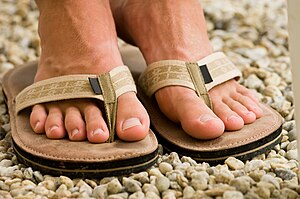One of the most common chronic diseases is peripheral neuropathy. This is a nerve disease that commonly affects the extremities.
The symptoms depend on which nerves are affected. It also differs on whether one nerve or multiple nerves are damaged.

The frequent symptoms are weakness of the muscles. When there is nerve damage, it is difficult to control the muscles. It can be hard to grip or open objects using the hands. The legs can also buckle or you may trip over because of this. There may also be frequent cramps or twitching of the extremities. There may be loss of coordination and on rare instances, even paralysis of the muscles.
Another common symptom is numbness in the arms or legs or both. This is an early sign of damage to the nerves. Often, the feet are first to be affected followed by the hands and arms as the condition progresses. Because of the loss of feeling in the lower extremities, you may not notice even if there is a blister on your feet. When the arms and hands are affected, one may not become aware of touching objects that is too hot or too cold. In some individuals, this can be felt as prickling sensations.
Others may experience severe symptoms such as pain especially during the night. A light touch of the bed sheet on the feet can sometimes be felt as burning pain. Sometimes there can be sharp pain or jabbing pain. This also happens when the nerve is damaged.
When any of the signs and symptoms of neuropathy are noted, one should seek medical advice at the soonest possible time. This will minimize the chances of having severe complications.
Medical practitioners agree that taking on a healthy lifestyle is vital in the management of peripheral neuropathy. For instance, doing regular exercises can reduce cramps, prevent muscle wasting, and increase muscle strength.
Vitamin deficiencies such as lack of thiamine can cause nerve problems. Correcting nutritional problems and low vitamin levels can greatly help relieve symptoms. A neuropathy supplement with thiamine, vitamin B12, and DHEA has been found to be an effective way to nutritionally manage peripheral neuropathy.
The symptoms depend on which nerves are affected. It also differs on whether one nerve or multiple nerves are damaged.

The frequent symptoms are weakness of the muscles. When there is nerve damage, it is difficult to control the muscles. It can be hard to grip or open objects using the hands. The legs can also buckle or you may trip over because of this. There may also be frequent cramps or twitching of the extremities. There may be loss of coordination and on rare instances, even paralysis of the muscles.
Another common symptom is numbness in the arms or legs or both. This is an early sign of damage to the nerves. Often, the feet are first to be affected followed by the hands and arms as the condition progresses. Because of the loss of feeling in the lower extremities, you may not notice even if there is a blister on your feet. When the arms and hands are affected, one may not become aware of touching objects that is too hot or too cold. In some individuals, this can be felt as prickling sensations.
Others may experience severe symptoms such as pain especially during the night. A light touch of the bed sheet on the feet can sometimes be felt as burning pain. Sometimes there can be sharp pain or jabbing pain. This also happens when the nerve is damaged.
When any of the signs and symptoms of neuropathy are noted, one should seek medical advice at the soonest possible time. This will minimize the chances of having severe complications.
Medical practitioners agree that taking on a healthy lifestyle is vital in the management of peripheral neuropathy. For instance, doing regular exercises can reduce cramps, prevent muscle wasting, and increase muscle strength.
Vitamin deficiencies such as lack of thiamine can cause nerve problems. Correcting nutritional problems and low vitamin levels can greatly help relieve symptoms. A neuropathy supplement with thiamine, vitamin B12, and DHEA has been found to be an effective way to nutritionally manage peripheral neuropathy.







